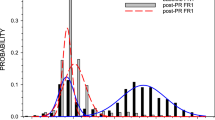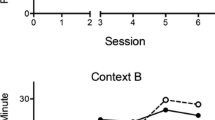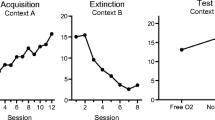Abstract
The effects of daily peripheral (IP) post-session injection of cocaine on the development of an autoshaped lever-touch response in rats were investigated. Male Sprague-Dawley rats received ten daily pairings of a retractable lever (conditioned stimulus; CS) and food delivery (unconditioned stimulus; UCS). Food delivery occurred if the subjects contacted the extended lever within 10 s, or, if the subjects failed to contact the lever, at the end of the 10-s stimulus interval. These contingencies resulted in increased lever-touch responses over 10 days of conditioning. Cocaine (5.6–19.0 mg/kg) impaired development of the lever-touch response, as compared to saline-treated control subjects. Because the injections were given immediately after each conditioning session, we suggest that cocaine affects the neural processes involved in consolidation. Three additional control experiments support this suggestion. The effect of cocaine on lever-touch acquisition was time-dependent as daily injection of cocaine (5.6 mg/kg) 3 h after each conditioning session did not affect lever-touch acquisition. In addition, the effect of cocaine was dependent upon the explicit pairing of lever extension (CS) and food delivery (UCS) as immediate post-session cocaine (5.6 mg/kg) administration did not alter responding when the presentation of both the CS and the UCS was uncorrelated. Cocaine (5.6 mg/kg) administered to subjects previously trained to a performance criterion did not affect lever-touch responding, indicating that cocaine administration (5.6 mg/kg) impairs the development, but not the maintenance, of autoshaped lever-touch responding. In contrast, the highest dose of cocaine tested, 19.0 mg/kg, did decrease lever-touch responding in well-trained subjects, indicating that post-session administration of higher doses of cocaine can produce aversive effects that may affect both the acquisition and maintenance of appetitively motivated behavior in the rat. The relative contributions of the instrumental and classical associations inherent in the autoshaping procedure were investigated by altering response contingencies. Rats showed no evidence of learning the lever-touch response when lever insertion and food delivery were positively correlated, and no explicit response contingency was present (classical conditioning); further, cocaine-treated subjects did not differ from saline-treated subjects. However, cocaine did impair lever-touch responding in the instrumental version of the task. Taken together, these results show that the post-session administration of cocaine can impair the acquisition of a multi-trial, multi-session appetitively motivated response.
Similar content being viewed by others
Author information
Authors and Affiliations
Additional information
Received: 24 February 1996 / Final version: 5 November 1996
Rights and permissions
About this article
Cite this article
Janak, P., Rodriguez, W. & Martinez Jr., J. Cocaine impairs acquisition of an autoshaped lever-touch response. Psychopharmacology 130, 213–221 (1997). https://doi.org/10.1007/s002130050231
Issue Date:
DOI: https://doi.org/10.1007/s002130050231




